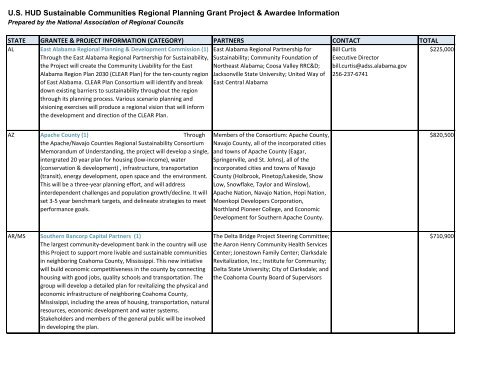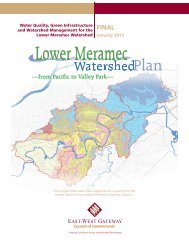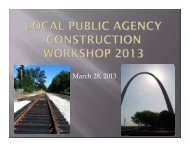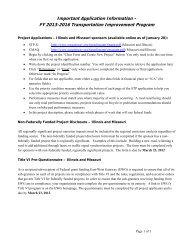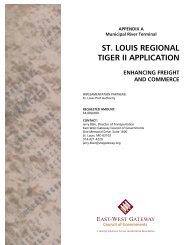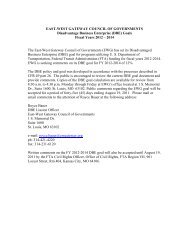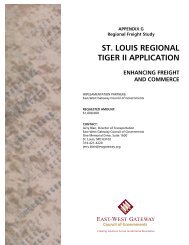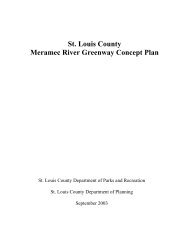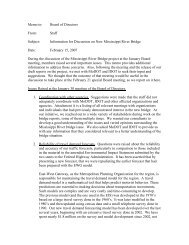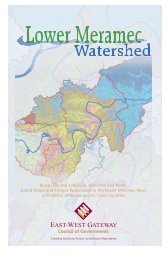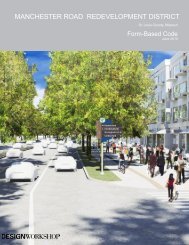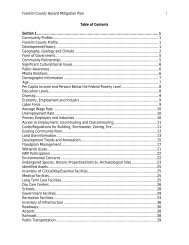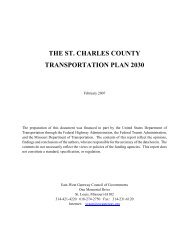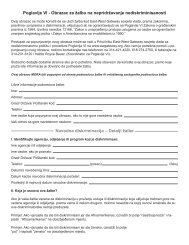US HUD Sustainable Communities Regional Planning Grant Project
US HUD Sustainable Communities Regional Planning Grant Project
US HUD Sustainable Communities Regional Planning Grant Project
You also want an ePaper? Increase the reach of your titles
YUMPU automatically turns print PDFs into web optimized ePapers that Google loves.
U.S. <strong>HUD</strong> <strong>Sustainable</strong> <strong>Communities</strong> <strong>Regional</strong> <strong>Planning</strong> <strong>Grant</strong> <strong>Project</strong> & Awardee Information<br />
Prepared by the National Association of <strong>Regional</strong> Councils<br />
STATE GRANTEE & PROJECT INFORMATION (CATEGORY) PARTNERS CONTACT TOTAL<br />
AL East Alabama <strong>Regional</strong> <strong>Planning</strong> & Development Commission (1) East Alabama <strong>Regional</strong> Partnership for Bill Curtis<br />
$225,000<br />
Through the East Alabama <strong>Regional</strong> Partnership for Sustainability, Sustainability; Community Foundation of Executive Director<br />
the <strong>Project</strong> will create the Community Livability for the East Northeast Alabama; Coosa Valley RRC&D; bill.curtis@adss.alabama.gov<br />
Alabama Region Plan 2030 (CLEAR Plan) for the ten-county region Jacksonville State University; United Way of 256-237-6741<br />
of East Alabama. CLEAR Plan Consortium will identify and break<br />
down existing barriers to sustainability throughout the region<br />
through its planning process. Various scenario planning and<br />
visioning exercises will produce a regional vision that will inform<br />
East Central Alabama<br />
the development and direction of the CLEAR Plan.<br />
AZ Apache County (1) Through<br />
the Apache/Navajo Counties <strong>Regional</strong> Sustainability Consortium<br />
Memorandum of Understanding, the project will develop a single,<br />
intergrated 20 year plan for housing (low-income), water<br />
(conservation & development) , infrastructure, transportation<br />
(transit), energy development, open space and the environment.<br />
This will be a three-year planning effort, and will address<br />
interdependent challenges and population growth/decline. It will<br />
set 3-5 year benchmark targets, and delineate strategies to meet<br />
performance goals.<br />
AR/MS Southern Bancorp Capital Partners (1)<br />
The largest community-development bank in the country will use<br />
this <strong>Project</strong> to support more livable and sustainable communities<br />
in neighboring Coahoma County, Mississippi. This new initiative<br />
will build economic competitiveness in the county by connecting<br />
housing with good jobs, quality schools and transportation. The<br />
group will develop a detailed plan for revitalizing the physical and<br />
economic infrastructure of neighboring Coahoma County,<br />
Mississippi, including the areas of housing, transportation, natural<br />
resources, economic development and water systems.<br />
Stakeholders and members of the general public will be involved<br />
in developing the plan.<br />
Members of the Consortium: Apache County,<br />
Navajo County, all of the incorporated cities<br />
and towns of Apache County (Eagar,<br />
Springerville, and St. Johns), all of the<br />
incorporated cities and towns of Navajo<br />
County (Holbrook, Pinetop/Lakeside, Show<br />
Low, Snowflake, Taylor and Winslow),<br />
Apache Nation, Navajo Nation, Hopi Nation,<br />
Moenkopi Developers Corporation,<br />
Northland Pioneer College, and Economic<br />
Development for Southern Apache County.<br />
The Delta Bridge <strong>Project</strong> Steering Committee;<br />
the Aaron Henry Community Health Services<br />
Center; Jonestown Family Center; Clarksdale<br />
Revitalization, Inc.; Institute for Community;<br />
Delta State University; City of Clarksdale; and<br />
the Coahoma County Board of Supervisors<br />
$820,500<br />
$710,900
CA California State University, Fresno Foundation The 14 cities - Stockton, Modesto, Manteca, Lodi,<br />
project is called Smart Valley Places and represents a consortium, Turlock, Merced, Madera, Clovis, Fresno,<br />
renewed commitment, and the ‘bridging capital’ to reverse harsh Visalia, Tulare, Porterville, Hanford, and<br />
local economic conditions and improve the Valley as an attractive Delano; California State University, Fresno;<br />
place to live, work, do business, and participate in California’s California Partnership for the San Joaquin<br />
healthy, prosperous, and sustainable future. The regional Valley and the San Joaquin Valley <strong>Regional</strong><br />
partnership includes Valley jurisdictions to develop shared vision Policy Council (represents all 8 MPOs in the<br />
and planning principles; capitalize on the prospective 21st century Valley)<br />
California High Speed Rail stops on the main line connecting Los<br />
Angeles and San Francisco; develop, adopt, and share state-of-theart<br />
sustainability land use, transportation, resource efficiency and<br />
community leadership planning tools and best practices; and<br />
interconnect the region to meaningfully and measurably<br />
overcome the deleterious array of local and regional challenges.<br />
CA Sacramento Area Council of Governments (2) <strong>Project</strong><br />
will increase the construction of housing and employment<br />
opportunities in Transit Priority Areas in a manner that promotes<br />
social equity, inclusion, access to opportunity, public health,<br />
neighborhood revitalization, and environmental sustainability. The<br />
effort, which is based off of SACOG's Blueprint, is intended to<br />
improve the integration of the housing, land use, and<br />
transportation components of the existing <strong>Regional</strong> <strong>Sustainable</strong><br />
Development Plan and cross-connect the <strong>Regional</strong> Plan for<br />
<strong>Sustainable</strong> Development to Federal, state, and local housing<br />
programs.<br />
Sacramento Housing and Redevelopment<br />
Agency, Urban Land Institute Sacramento<br />
Chapter, UC Davis Center for <strong>Regional</strong><br />
Change, the <strong>Regional</strong> Water Authority, Valley<br />
Vision, and local governments in the region<br />
Thomas McClanahan<br />
Associate Vice President<br />
CSU, Fresno<br />
559.278.0840<br />
Joe Concannon<br />
Data Services Manager<br />
jconcannon@sacog.org<br />
916.340.6234<br />
$4,000,000<br />
$1,500,000
CT Capitol Region Council of Governments (2)<br />
This <strong>Project</strong> will implementia bi-state <strong>Sustainable</strong> Knowledge<br />
Corridor in the Hartford and Springfield regions. The bi-state<br />
Knowledge Corridor Consortium will will: (1) update and integrate<br />
existing regional plans to form a Knowledge Corridor Detailed<br />
Execution Plan for a <strong>Sustainable</strong> Region; (2) build off of major<br />
Federal investments in the region—the Springfield-New Haven rail<br />
line, the New Britain-Hartford Busway, and the CRCOG<br />
Sustainability Development Guidelines—to create energy-efficient,<br />
affordable housing opportunities near transit and job centers in<br />
well-designed, mixed-use settings; and (3) establish imaginative<br />
new efforts such as affordable housing training for zoning<br />
commissioners; incentives for density creation in transit-rich<br />
locations; studies to help establish pilot feeder bus service to link<br />
jobs, housing and transit; a web-based platform to share<br />
information on successful land use strategies and progress toward<br />
a more sustainable Knowledge Corridor, opportunity mapping,<br />
and studies on how to harvest increased land values near stations<br />
and plow it back into affordable housing and transit<br />
infrastructure. These initiatives will not only inform policy efforts<br />
but will also provide knowledge-sharing models for other regions.<br />
CT Windham Region Council of Governments (1)<br />
The Eastern Connecticut <strong>Sustainable</strong> <strong>Communities</strong> <strong>Regional</strong><br />
<strong>Planning</strong> Consortium will integrate multi-regional plans to address<br />
workforce development, transportation, housing, economic<br />
development, infrastructure, and land use into a multifacted<br />
regional plans, and will include an analysis of current plans in the<br />
greater Easter Connecticut region.<br />
Pioneer Valley <strong>Planning</strong> Commission<br />
Central Connecticut <strong>Regional</strong> <strong>Planning</strong><br />
Agency City of Hartford, City of New Britain,<br />
Central Connecticut State University, Town of<br />
Manchester, Town of Windsor, United Way<br />
of Connecticut, Partnership for Strong<br />
<strong>Communities</strong>, University of Hartford,<br />
University of Connecticut, 1000 Friends of<br />
Connecticut, Connecticut Fair Housing<br />
Center, Connecticut Housing Coalition,<br />
MetroHartford Alliance, Connecticut<br />
Economic Resource Center, Greater Hartford<br />
Transit District, Goodwin College, Northeast<br />
Utilities, Connecticut Department of<br />
Economic and Community Development,<br />
Connecticut Department of Transportation,<br />
Connecticut Department of Environmental<br />
Protection, Connecticut Housing Finance<br />
Authority, CT Main Street, Inc., Local<br />
Initiative Support Corporation, Connecticut<br />
Coalition to End<br />
Homelessness, Transit for Connecticut<br />
Coalition, University of Massachusetts, City<br />
of Chicopee, <strong>Regional</strong> Employment Board of<br />
Hampden County, United Way of Pioneer<br />
Valley, United Way of Hampshire County,<br />
Valley Development Council, Massachusetts<br />
Department of Transportation, Pioneer<br />
Valley<br />
Sustainability Network, and the Mass<br />
Executive Office of Housing and Economic<br />
Eastern Connecticut Workforce Investment<br />
Board, Southeastern Connecticut Council of<br />
Governments, Northeastern Connecticut<br />
Council of Governments, and Southeastern<br />
Connecticut Housing Alliance<br />
Lyle Wray<br />
Executive Director<br />
(860) 522-2217 x232<br />
Mark Paquette<br />
Executive Director<br />
director@wincog.org<br />
(860) 456-2221<br />
$4,200,000<br />
$225,000
FL South Florida <strong>Regional</strong> <strong>Planning</strong> Council (1)<br />
Treasure Coast <strong>Regional</strong> <strong>Planning</strong> Council<br />
The <strong>Project</strong>'s key component is the development of a “2060 Click HERE to view the entire list of partners.<br />
Southeast Florida <strong>Regional</strong> Plan for <strong>Sustainable</strong> Development” to<br />
create cohesive, integrated regional “vision” across issue areas<br />
and jurisdictional boundaries for the 2 council region. The plan will<br />
1) serve as the framework for future federal investment; 2)<br />
support the efforts of individual counties, municipalities and other<br />
regional partners whose plans and projects further the<br />
implementation of the regional Vision and Plan; and 3) put the<br />
Southeast Florida Region in the best position possible to capture<br />
federal funds for critical infrastructure projects designed to<br />
improve the region’s sustainability. The project will integrate data,<br />
tools, and models to assess the region today, understand the<br />
region's future, and track progress toward the vision and the<br />
RPSD. A monitoring plan will focus on measuring progress toward<br />
specific regional outcomes aligned with all six Livability Principles,<br />
plus a seventh climate change principle because of Southeast<br />
Florida‘s unique vulnerability to its most severe impacts. The<br />
group will build and sustain inclusive leadership and partnerships<br />
to strengthen regional collaboration and stewardship, providing a<br />
foundation for the region's future long-term success. That the<br />
Southeast Florida <strong>Regional</strong> Partnership already has 194 member<br />
and supporting organizations and can leverage $136 million in<br />
Federal, state, and local funds toward development and<br />
implementation of the RPSD, provides a strong testimony to the<br />
consortium‘s commitment to creating a region that is<br />
economically competitive and prosperous, socially inclusive, and<br />
environmentally sustainable.<br />
FL Central Florida <strong>Regional</strong> <strong>Planning</strong> Council (1)<br />
Through the Heartland 2060 Consortium, the project will create a<br />
vision for the future that enables growth while preserving natural<br />
areas and protecting wildlife and agricultural production,<br />
supporting sustainable, healthy communities of all sizes, and<br />
ensuring a vibrant economic and social life.<br />
Florida's Heartland Rural Economic<br />
Development Initiative, Desoto County, and<br />
Glades County<br />
Michael Busha<br />
Executive Director, TCRPC<br />
mbusha@tcrpc.org<br />
772.221.4060<br />
Isabel Cosio Carballo<br />
Coordinator, Legislative & PA<br />
SFRPC<br />
isabelc@sfrpc.com<br />
(954) 985-4416<br />
Pat Steed<br />
Executive Director<br />
psteed@cfrpc.org<br />
(863) 534-7130, ext. 130<br />
$4,250,000<br />
$1,400,000
IL Chicago Metropolitan Agency for <strong>Planning</strong> (2)<br />
This will help fund the implementation of CMAP's GOTO 2040<br />
Plan, which links transportation, land use, housing, economic<br />
growth, the natural environment, and human and community<br />
development, with the overarching goals of improving livability<br />
and bringing about sustainable prosperity. Specifically, it will fund<br />
the the Local Technical Assistance (LTA) program, which will create<br />
new resources for technical assistance and result in a series of<br />
innovative, replicable projects that link housing, land use and<br />
transportation in the Chicago region that support livability<br />
principles and build capacity in local communities.<br />
IL Tri-County <strong>Regional</strong> <strong>Planning</strong> Commission (2)<br />
Through the Heart of Illinois Sustainability Consortium, the project<br />
will expand the scope of sustainability planning in this region, and<br />
begin implementing recommendations from The Big Plan and<br />
develop plans to integrate innovative stormwater management<br />
and public art into public spaces, improve housing choice and<br />
affordability, engage the underserved populations of the urban<br />
core with culturally-relevant economic opportunities, promote<br />
local food sustainability through local agriculture, and advance<br />
green building practices and green jobs. The Big Plan is an<br />
integrated regional plan for transportation, land use, and<br />
ecosystem sustainability in the Peoria Tri-County region.<br />
IL Rockford Metropolitan Agency for <strong>Planning</strong> (1)<br />
This <strong>Project</strong> will further the work on "A Blueprint to a More<br />
<strong>Sustainable</strong> and Dynamic Rockford Region," which is an integrated<br />
2040 Long Range Transportation Plan. The goals of the Blueprint<br />
are enhanced and better-integrated planning and investment in<br />
housing and transportation infrastructure; more enlightened and<br />
sustainable land use planning and investment; a vision for<br />
sustainable growth; a recognition that urban planning can either<br />
enhance or damage economic development, and more integrated<br />
cooperation among leadership agencies in the Rockford Region.<br />
Diverse consortium - Click HERE Randy Blankenhorn<br />
Executive Director<br />
312-454-0400<br />
rblankenhorn@cmap.illinois.gov<br />
Illinois Central College, the Economic<br />
Development Council for Central Illinois,<br />
Peoria Park District, Peoria Housing<br />
Authority, Bradley University, OSF St. Francis<br />
Medical Center and ArtsPartners<br />
City of Rockford, Winnebago County, the City<br />
of Belvidere, the City of Loves Park, Boone<br />
County, the Village of Machesney Park, the<br />
Rockford Area Economic Development<br />
Council, the Rockford Housing Authority,<br />
Chicago/Rockford International Airport, the<br />
Rock River Development Partnership, Align<br />
Rockford and others<br />
Terry Kohlbuss<br />
Executive Director<br />
tkohlbuss@tricountyrpc.org<br />
(309) 673-9330<br />
Stephen Ernst<br />
Executive Director<br />
steve.ernst@rockfordil.gov<br />
815.987.5628<br />
$4,250,000<br />
$1,200,000<br />
$600,000
IN Evansville Metropolitan <strong>Planning</strong> Organization (1) A<br />
consortium of government and non-profit organizations has been<br />
assembled to develop a <strong>Regional</strong> Plan for <strong>Sustainable</strong><br />
Development (RPSD) for the greater Evansville region. This new<br />
consortium would collaborate to integrate land use, housing, and<br />
transportation planning within the region, taking special care to<br />
improve the situation of the region‘s marginalized populations,<br />
particularly through the provision of more transportation choices<br />
and affordable housing. The City of Evansville has already made<br />
significant investments to encourage sustainable development<br />
and revitalize its urban core.<br />
IA Des Moines Area Metropolitan <strong>Planning</strong> Organization (1)<br />
The <strong>Project</strong> will create regional planning for sustainable housing,<br />
environmental and land use, and will provide the opportunity to<br />
produce a long-range regional transit plan and a strategic plan for<br />
economic and workforce development, both of which are vital<br />
components of the central Iowa <strong>Regional</strong> Plan for <strong>Sustainable</strong><br />
Evansville Dept. of Metropolitan<br />
Development, Housing Authority of Henson,<br />
Keep Evansville Beautiful, and Evansville<br />
Tarnsportation & Services<br />
Des Moines Area <strong>Regional</strong> Transit Authority,<br />
the Greater Des Moines Partnership, the<br />
Community Foundation of Greater Des<br />
Moines and all of the local governments in<br />
the area<br />
Development.<br />
KY University of Kentucky Research Foundation for Sustainability (1) Community & Economic Development<br />
The <strong>Project</strong> will support more livable and sustainable communities Initiative of Kentucky, Fulton Hickman<br />
in western Kentucky and Tennessee, and will target the Delta Economic Development Partnership, City of<br />
Region's areas of extreme poverty and poor health. The effort will Fulton, KY, and Obion County, TN<br />
also look to build economic competitiveness by connecting<br />
housing with good jobs, quality schools and transportation. The<br />
funding will benefit five counties: Fulton and Hickman in Kentucky,<br />
and Lake, Obion, and Weakley in Tennessee.<br />
ME Northern Maine Development Commission (1)<br />
The <strong>Project</strong> will create an integrated regional plan that addresses<br />
housing, transportation, water infrastructure, environmental<br />
planning, economic opportunity, and workforce development.<br />
NMDC will utilize its strategic planning initiative to provide crosscutting<br />
discussions to engage the non-profit, municipal and county<br />
organizations of Washington and Aroostook Counties, and will<br />
engage area residents, organizations, and communities.<br />
Washington County Council of Governments,<br />
Sunrise County Economic Council, Hancock<br />
Community Agency, Aroostook County<br />
Action Program, University of ME at Machias,<br />
State of ME, ME DOT, and Four Directions<br />
Development Corporation<br />
Brad Mills<br />
Executive Director<br />
bmills@evansvillempo.com<br />
812.436.7833<br />
Tom Kaine<br />
Executive Director<br />
tjkane@dmampo.org<br />
515.334.0075<br />
Michael Wilcox<br />
Asst. Professor<br />
Dept. of Agriculture & Resource<br />
Economics<br />
University of Tennessee<br />
mwilcox2@utk.edu<br />
865.974.7410<br />
Robert Clark<br />
Executive Director<br />
rclark@nmdc.org<br />
207-498-8736<br />
$1,420,300<br />
$2,200,000<br />
$680,000<br />
$800,000
ME Greater Portland Council of Governments (1)<br />
The <strong>Project</strong> will help continue the development of growth plans<br />
that will strengthen the community and economy, promote equity<br />
among area residents, improve transportation and encourage<br />
energy conservation. The next several years of the effort will be<br />
spent soliciting community input and creating an implementation<br />
plan. The RPSD process focuses on developing fact-filled<br />
awareness of the sustainability and equity implications of current<br />
trends in the region‘s development against choice scenarios to be<br />
developed through a cooperative process among the multiple<br />
municipalities in subareas of the region and for the different<br />
settings involved: urban core neighborhoods, new transit-capable<br />
urban neighborhood, suburban nodes, and revitalized village<br />
centers.<br />
MA Metropolitan Area <strong>Planning</strong> Council (2)<br />
Through the Metro Boston Consortium for <strong>Sustainable</strong><br />
<strong>Communities</strong>, the <strong>Project</strong> will implement the regional plan,<br />
MetroFuture. It will help fund activities ranging from rewriting<br />
local zoning bylaws to developing “transit-oriented”<br />
neighborhoods, all designed to make Greater Boston a more<br />
prosperous and equitable place to live. The project will also<br />
develop new tools and models for local implementation of the<br />
MetroFuture vision, with a distinct approach for each of four<br />
community types. These tools and models will continue to<br />
advance MetroFuture long after the funding period ends. The<br />
Consortium will also conduct regional and state-level policy work<br />
designed to remove barriers and create incentives for smart<br />
growth. The program will build thecapacity of local leaders<br />
through education, workshops, and opportunities for crossregional<br />
dialogue.<br />
MA Berkshire <strong>Regional</strong> <strong>Planning</strong> Commission (1)<br />
The <strong>Project</strong> will develop a plan that integrates all components of<br />
the economy into a comprehensive strategy with the<br />
infrastructure, housing, and land use supports needed to achieve<br />
strong economic competitiveness and address sub-regional<br />
disparities. The economy has seen a steady decline in traditional<br />
manufacturing and mill jobs, while at the same time emerging as a<br />
leader at fostering a "creative economy" atmosphere and<br />
renewed interest in local food production. This will be<br />
incorporated into the planning effort.<br />
26 government and community organizations<br />
- Southern ME <strong>Regional</strong> <strong>Planning</strong><br />
Commission, Muskie School of Public Service<br />
at University of ME, ME DOT, ME State<br />
<strong>Planning</strong> Office, ME Turnpike Authority, City<br />
of Portland, City of South Portland,<br />
Cumberland County, Avesta Housing, Town<br />
of Brunswick, Mid-Coast <strong>Regional</strong><br />
Redevelopment Authority, Town of Kittery,<br />
Town od Sanford, Trust for Public Land, and<br />
Grow Smart ME<br />
55 municipalities (representing 71% of the<br />
region’s residents); state agencies; and more<br />
than 50 community based organizations,<br />
advocacy groups, academic institutions,<br />
business interests, foundations, public<br />
housing authorities, and other partners<br />
Metropolitan <strong>Planning</strong> Organization; City of<br />
Pittsfield; City of North Adams; Berkshire<br />
Towns; Berkshire Creative; Berkshire Visitors'<br />
Bureau; Housatonic Heritage; Berkshire<br />
Community Action Council; Berkshire<br />
Housing Development Corporation; Berkshire<br />
County <strong>Regional</strong> Housing Authority;<br />
Berkshire United Way; Berkshire Health<br />
Systems; Berkshire Natural Resources<br />
Council; MA Fisheries and Wildlife, Andrew<br />
Madden; Center for Ecological Technology<br />
Neal Allen<br />
Executive Director<br />
nallen@gpcog.org<br />
207-774-9891<br />
Marc Draisen<br />
Executive Director<br />
mdraisen@mapc.org<br />
617-451-2770<br />
Nathaniel Karns<br />
Executive Director<br />
nkarns@berkshireplanning.org<br />
(413) 442-1521<br />
$1,600,000<br />
$4,000,000<br />
$590,700
MA Franklin <strong>Regional</strong> Council of Governments (1)<br />
The <strong>Project</strong> will will conduct a comprehensive planning process to<br />
assess the needs of the region - particularly among disadvantaged<br />
populations - with respect to housing, transportation, economic<br />
development, energy, infrastructure (water, sewer,<br />
telecommunications), and natural and cultural resources. The<br />
planning process will identify: impediments to fair housing;<br />
strategies to increase jobs with living wages; infrastructure<br />
improvements needed to support sustainable development<br />
patterns; suitable locations for new development and<br />
redevelopment; critical resources requiring protection, such as<br />
water recharge areas for drinking water supplies and prime<br />
farmland for food production; and ways to reduce energy<br />
consumption and greenhouse gas emissions. The effort will also<br />
provide some funding for specific projects within the region's<br />
towns, and will place an emphasis on disadvantaged people.<br />
MI Southeast Michigan Council of Governments (2)<br />
The <strong>Project</strong> will unify transportation with sustainable housing and<br />
redevelopment, and help communities look at how they can be<br />
sustainable over the long haul, including better linking workforce<br />
training to the business communities; redeveloping older<br />
community assets, such as the Ypsilanti Ford plant; and looking at<br />
housing, streets, green infrastructure, and energy efficiency. Also<br />
necessary is taking a look at infrastructure -- those roads, bridges,<br />
and water and sewer systems -- which is about to reach crisis<br />
status.<br />
MN Metropolitan Council (2)<br />
The <strong>Project</strong> will support development along the region’s growing<br />
network of transit corridors in ways that make transit more<br />
successful, promote housing and transportation affordability and<br />
availability, and make communities more vital. It will include<br />
public involvement in creating corridor-wide plans and strategies<br />
for optimal development along five major corridors, including<br />
Southwest LRT, Bottineau, Cedar Avenue Bus Rapid Transit,<br />
Northstar Commuter Rail and the Gateway Corridor (I-94 East),<br />
using “beyond the rail” planning of Central Corridor LRT as a<br />
model.<br />
Community Action, the Franklin County<br />
Housing and Redevelopment Authority, the<br />
North Quabbin Community Coalition and the<br />
Franklin County Community Development<br />
Corp., the Towns of Greenfield, Montague,<br />
Orange and Deerfield, Franklin <strong>Regional</strong><br />
Transit Authority, Greenfield Community<br />
College, Franklin-Hampshire <strong>Regional</strong><br />
Employment Board, River Culture,<br />
<strong>Communities</strong> Involved in Sustaining<br />
Agriculture, Franklin County Home Care,<br />
Franklin <strong>Regional</strong> <strong>Planning</strong> Board, and<br />
Franklin County Chamber of Commerce.<br />
Livingston County, Macomb County &<br />
Economic Development, Monroe County,<br />
ERB Family Foundation, Oakland County, St.<br />
Clair County Metro <strong>Planning</strong> Commission,<br />
Washtenaw County, Wayne County, Detroit<br />
<strong>Planning</strong> & Development, Detroit Economic<br />
Growth Corporation, Metropolitan Affairs<br />
Coalition, The Kresge Foundation, The<br />
Cultural Alliance of Southeastern Michigan,<br />
WARM Training Center green<br />
Minnesota Housing, the Counties Transit<br />
Improvement Board, Hennepin and Ramsey<br />
counties, the cities of Minneapolis and St.<br />
Paul and the McKnight Foundation,<br />
University of Minnesota, Central Corridor<br />
Funders Collaborative and the Ford<br />
Foundation. The Alliance for Metropolitan<br />
Stability, Minnesota Center for<br />
Neighborhood Organizing and Nexus<br />
Community Partners<br />
Linda Dunlavy<br />
Executive Director<br />
lindad@frcog.org<br />
(413) 774-3167<br />
Paul Tait<br />
Executive Director<br />
tait@semcog.org<br />
(313) 961-4266<br />
Peter Bell<br />
Council Chair<br />
651.602.1390<br />
peter.bell@metc.state.mn.us<br />
$425,000<br />
$2,850,000<br />
$5,000,000
MN Region Five Development Commission (1)<br />
<strong>Regional</strong> <strong>Sustainable</strong> Development<br />
The <strong>Project</strong> will use collaborative pla+B33nning to encourage longterm<br />
social, economic and environmental sustainability in the<br />
communities within Cass, Crow Wing, Morrison, Todd, and<br />
Wadena counties by bringing together rural communities across<br />
central Minnesota. The planning work will support year-round<br />
economic development within the eco-tourism industry, local<br />
goods, renewable energy and agriculture while preparing for an<br />
aging population that needs more transportation options.<br />
MS Gulf <strong>Regional</strong> <strong>Planning</strong> Commission (1)<br />
The <strong>Project</strong> will create the “Constituency for a <strong>Sustainable</strong> Coast,<br />
the Gulf Coast Plan," the firstever comprehensive regional plan for<br />
14 jurisdictions. The plan will focus on equitable housing,<br />
sustaining the economy, integrated land use and modal planning,<br />
climate change for sustainable development, clean watershed,<br />
food systems, clean air and a locally grown sustainable<br />
infrastructure. An example of plan efforts include bringing<br />
housing, economic development, transportation, and social equity<br />
interests together toward the desired outcomes of reducing per<br />
capita vehicle miles travelled and uniting sewer and stormwater<br />
infrastructure planning with habitat protection in order to address<br />
water quality.<br />
MO East-West Gateway Council of Governments (1)<br />
The <strong>Project</strong> will organize a process of community planning and<br />
collaboration across jurisdictional boundaries that will rely on<br />
citizen and public official participation. The <strong>Project</strong> will conduct<br />
ongoing research, gather data, and involve a consortium of<br />
government and non-profit partners to devise regional and subregional<br />
plans to coordinate housing, transportation, the<br />
environment and economic development to give the region a<br />
better chance to sustain its current affordability and further its<br />
economic progress.<br />
Partnerships; Initiative Foundation; Central<br />
CERT- CMAERC; Central MN Housing<br />
Partnership; 1000 Friends of MN; University<br />
of Minnesota Research Centers; Crow Wing<br />
County; Central Lakes College; MNDOT; Short<br />
Elliott Hendrickson, SHE; Department of<br />
Employment & Economic Development;<br />
Minnesota Housing Finance Agency;<br />
Minnesota Pollution Control Agency;<br />
University of Minnesota<br />
Southern Mississippi <strong>Planning</strong> and<br />
Development District, the Gulf Coast<br />
Community Design Studio, Gulf Coast<br />
Renaissance Corp., Ohio State University and<br />
the Kirwan Institute and the Mississippi<br />
Center for Justice, and Gulfport, Biloxi and<br />
Pascagoula also will be part of the<br />
consortium, as well Harrison, Hancock and<br />
Jackson counties.<br />
City of St. Louis, St. Louis County and FOC<strong>US</strong><br />
St. Louis, Trailnet, Citizens for Modern<br />
Transit, Metro, Great Rivers Greenway,<br />
Metro St. Louis Equal Housing Opportunity<br />
Council, Southwestern Illinois Resource<br />
Conservation and Development, and the<br />
Applied Research Collaborative (St. Louis<br />
University, University of Missouri – St. Louis<br />
and Southern Illinois at Edwardsville).<br />
Cheryal Lee Hills<br />
Executive Director<br />
chills@regionfive.org<br />
218-894-3233<br />
Elaine Wilkinson<br />
Executive Director<br />
egw@grpc.com<br />
228-864-1167<br />
Ed Hillhouse<br />
Executive Director<br />
Ed.Hillhouse@ewgateway.org<br />
(314) 421-4220<br />
$825,050<br />
$2,000,000<br />
$4,687,750
MO Mid-America <strong>Regional</strong> Council (2)<br />
The <strong>Project</strong>, "Creating <strong>Sustainable</strong> Places," will advance the<br />
region's vision of achieving sustainability through the creation of<br />
vibrant, green and connected centers and corridors. The proposal<br />
represents the continuation of years of work through MARC's<br />
Creating Quality Places initiative, Imagine KC citizen engagement<br />
process, and Transportation Outlook 2040, the region's newly<br />
adopted long-range transportation plan. It aims to put tools in the<br />
hands of local communities.<br />
NY <strong>Regional</strong> Plan Association (2)<br />
Through the New York-Connecticut Metropolitan <strong>Sustainable</strong><br />
<strong>Communities</strong> Consortium, the <strong>Project</strong> will integrate housing,<br />
economic development, transportation and environmental<br />
planning in the bi-state metropolitan region. It will also develop<br />
livable communities and growth centers around existing and<br />
planned transit to enhance affordable housing efforts, reduce<br />
congestion, improve the environment and continue to expand<br />
economic opportunities. At the local level, the Consortium will<br />
support project planning to engage residents and stakeholders in<br />
developing implementation strategies.<br />
NC Land of Sky <strong>Regional</strong> Council (1)<br />
Through the Western North Carolina Livable <strong>Communities</strong><br />
Consortium, the <strong>Project</strong> will develop a twenty-year Actionable<br />
Implementation Strategy (AIS) that comprehensively integrates or<br />
“weaves” the regions many existing planning documents in<br />
comprehensive and holistic guide for regional sustainable<br />
development. The effort will involve participation from<br />
populations that are traditionally left out of regional planning<br />
processes (including rural mountain landowners, farmers, urban<br />
minority populations, small business owners, seasonal second<br />
homeowners, health care providers) to solicit their input and<br />
commitment to the planning process and the final plan.<br />
Over 50 partners - Click HERE David Warm<br />
Executive Director<br />
dwarm@marc.org<br />
816/474-4240<br />
Cities of New York, New Haven, Bridgeport,<br />
Norwalk, Stamford, Yonkers, White Plains,<br />
New Rochelle, and Mount Vernon; Nassau<br />
and Suffolk Counties; New York<br />
Metropolitan Transportation Council; South<br />
Western <strong>Regional</strong> Metropolitan <strong>Planning</strong><br />
Organization; Greater Bridgeport/Valley<br />
Metropolitan <strong>Planning</strong> Organization; South<br />
Central <strong>Regional</strong> Council of Governments;<br />
and Long Island <strong>Regional</strong> <strong>Planning</strong> Council<br />
French Broad River Metropolitan <strong>Planning</strong><br />
Organization; Land-of-Sky Rural <strong>Planning</strong><br />
Organization; City of Asheville; Buncombe<br />
County; State of North Carolina; The<br />
Community Foundation of Western North<br />
Carolina; Advantagewest; Asheville Area<br />
Chamber of Commerce; Renaissance<br />
Computing Institute of the University of<br />
North Carolina at Asheville; Asheville<br />
Housing Authority; Asheville-Buncombe<br />
<strong>Sustainable</strong> <strong>Communities</strong>; Initiative of the<br />
Asheville HUB; and Asheville Design Center<br />
Chris Jones<br />
Vice President for Research<br />
chris@rpa.org<br />
(212) 253.5763<br />
Joe McKinney<br />
Executive Director<br />
jmckinney@landofsky.org<br />
(828) 251-6622<br />
$4,250,000<br />
$5,000,000<br />
$1,600,000
NC Piedmont Authority for <strong>Regional</strong> Transportation (1)<br />
The <strong>Project</strong> will create a comprehensive, integrative plan that<br />
includes all factors realting to the quality of life in the Triad, and<br />
develop usable tools that counties, cities, towns, communities,<br />
neighborhoods and families can use to create a more sustainable<br />
lifestyle. The effort will encourage investments in revitalization<br />
and redevelopment in major cities and smaller towns, focusing on<br />
deteriorating neighborhoods and abandoned manufacturing<br />
areas.<br />
OH Northeast Ohio Areawide Coordinating Agency (1)<br />
Through the Northeast Ohio Consortium, the <strong>Project</strong> will be used<br />
to create a cooperative regional sustainability plan addressing<br />
equitable housing, land use, transportation, community<br />
development, water and sewer infrastructure, and economic<br />
development issues for a 12-county planning area. The effort will<br />
work to cultivate a 21st-century workforce to lift up economically<br />
disadvantaged communities, engage residents and businesses in<br />
planning that establishes Northeast Ohio as a place of choice to<br />
live and work. It will also coordinate land use planning to foster a<br />
sustainable tax base in all communities through ongoing<br />
collaboration and dialogue across functions and political<br />
boundaries. Additionally, the Agency will promote equitable,<br />
affordable housing; adopt a "fix-it first" housing strategy that<br />
minimizes blight and creates affordable alternatives for all income<br />
brackets; and provide mobility counseling for low-income<br />
residents to promote zip codes of opportunity.<br />
OR Lane Council of Governments (2)<br />
The <strong>Project</strong> will used to implement and refine Metro Plan which, is<br />
the region's guiding land use policy document and already<br />
includes a sustainability plan. By building regional capacity for<br />
more collaborative discussions the Council will be prepared to<br />
take on the content-specific gaps in their existing plan, which<br />
include climate change, public health, and social equity.<br />
Burlington-Graham Urban Area Metro.<br />
<strong>Planning</strong> Org, City of Burlington, City of<br />
Greensboro, City of High Point, City of<br />
Winston-Salem, Greensboro Urban Area<br />
MPO., High Point Urban Area MPO,<br />
Northwest Piedmont Triad Council of<br />
Governments, Northwest Piedmont Triad<br />
Rural <strong>Planning</strong> Organization, Piedmont Triad<br />
Partnership (PTP), Piedmont Triad Council of<br />
Governments, Piedmont Triad Rural <strong>Planning</strong><br />
Organization, Winston-Salem Urban Area<br />
MPO<br />
Counties of Ashtabula, Cuyahoga, Geauga,<br />
Lake, Lorain, Mahoning, Medina, Portage,<br />
Summit, Stark, Trumbull and Wayne; Akron<br />
Metropolitan Area Transportation Study<br />
(AMATS); Eastgate <strong>Regional</strong> Council of<br />
Governments (Eastgate); Stark County<br />
<strong>Regional</strong> <strong>Planning</strong> Commission/Stark County<br />
Area Transportation Study (RPC/SCATS);<br />
Cities of Akron, Canton , Cleveland, Warren,<br />
and Youngstown; Akron Metropolitan<br />
Housing Authority; Cleveland State University<br />
Maxine Goodman Levin College of Urban<br />
Affairs; Cuyahoga Metropolitan Housing<br />
Authority; Fund for Our Economic Future<br />
<strong>Regional</strong> Prosperity Initiative; and Stark<br />
Metropolitan Housing Authority<br />
Lane County, the cities of Eugene and<br />
Springfield, Housing and Community Services<br />
Agency of Lane County, the Lane Transit<br />
District, the University of Oregon, the Central<br />
Lane MPO, St. Vincent de Paul of Lane<br />
County and Oregon Housing and Community<br />
Services, ODOT<br />
Brent McKinney<br />
Executive Director<br />
brentm@partnc.org<br />
336-662-0002<br />
Howard Maier<br />
Executive Director<br />
hmaier@mpo.noaca.org<br />
(216) 241-2414<br />
George Kloeppel<br />
Executive Director<br />
gkloeppel@lcog.org<br />
541.682.4395<br />
$1,600,000<br />
$4,250,000<br />
$1,450,000
SD Thunder Valley Community Development Corporation (1)<br />
Trough the Oglala Sioux Tribe consortium, the organization, which<br />
works to empower youth and families through a focus on health,<br />
culture, and the environment, will develop a plan builds on<br />
current efforts to work with communities on the Pine Ridge Lakota<br />
Sioux reservation to integrate housing, improve transportation,<br />
and increase workforce opportunities for tribal members. This will<br />
take place in the remote, rural portion of southwestern South<br />
Dakota within the geographic boundaries of the Pine Ridge Indian<br />
Reservation.<br />
TN City of Knoxville, TN (1)<br />
The <strong>Project</strong> will develop a comprehensive plan for a more<br />
sustainable East Tennessee which will cover wide range of issues<br />
including air and water quality, economic and workforce<br />
development, healthy living, housing issues, land use and<br />
transportation. It will focus on getting local governments and key<br />
organizations in Knox, Blount, Anderson, Union and Loudon<br />
Counties to develop the region's capacity to work together for a<br />
more sustainable future. The last step is adopting a regional plan<br />
for sustainable development and a regional implementation plan<br />
with a focus on five demonstration communities one in each<br />
county of the Knoxville MSA.<br />
The OST Office of the President; The Oglala<br />
Sioux (Lakota) Housing Authority (OSLHA);<br />
The OST Partnership for Housing (OSTPH);<br />
Mazaska Owecaso Otipi Financial, Inc.<br />
(MOOFI); OST Environmental Protection<br />
Program (OST-EPP); The OST Rural Water<br />
Authority (OSTRWA); The OST Health<br />
Administration (OSTHA); The OST Office of<br />
Economic Development (OSTOED); The OST<br />
Land Office (OSTLO), Pine Ridge Bureau of<br />
Indian Affairs (BIA); Pine Ridge Area Chamber<br />
of Commerce (PRACC); Lakota Funds<br />
Knox, Blount, Loudon, Anderson and Union<br />
Counties, the Metropolitan <strong>Planning</strong><br />
Commission (MPC), University of Tennessee,<br />
Oak Ridge National Laboratory, Knoxville<br />
Area Urban League, East Tennessee<br />
Community Design Center, The East<br />
Tennessee Development District, Knoxville's<br />
Community Development Corporation,<br />
Maryville College and the East Tennessee<br />
Quality Growth Organization.<br />
Nick Tilsen<br />
Executive Director<br />
nick@thundervalley.org<br />
605-455-2700<br />
Madeline Rogero<br />
Community Development<br />
Director, City of Knoxville<br />
mrogero@cityofknoxville.org<br />
865-215-2865<br />
$996,100<br />
$4,327,500
TX Houston-Galveston Area Council (1)<br />
The <strong>Project</strong> will develop a sustainable development<br />
comprehensive plan through stakeholder-driven efforts that<br />
support and enrich workforce improvements, facilitate job growth<br />
and attract new residents, conserve the natural environment and<br />
enhance the built environment, and<br />
enable the pursuit of federal funding for implementation of<br />
transportation, housing, hazard mitigation,<br />
and community and economic development projects that further<br />
sustainability in the region.<br />
TX Capital Area Council of Governments (2)<br />
The <strong>Project</strong> will use the Capital Area Metropolitan <strong>Planning</strong><br />
Organization 2035 Long-Range Transportation Plan, which<br />
envisions future regional growth, to create a network of 37 mixeduse,<br />
mixed-income, walkable, connected and transit-supportive<br />
Activity Centers. The centers will provide a balanced mix of jobs,<br />
housing, and services, primarily within the context of existing<br />
communities. The concept is designed to improve the region’s<br />
livability in the areas of transportation, air and water quality,<br />
social equity and opportunity.<br />
UT Salt Lake County (2)<br />
The <strong>Project</strong> will create an affordable housing plan, the study of six<br />
transit-oriented development sites, and the creation of<br />
sustainability blueprints that can be used locally, regionally and<br />
nationally. Additionally, the project will fund potential transitoriented<br />
development sites, how governments are going to<br />
incentivize more future transit-oriented developments, and<br />
retooling of land use regulations to promote the sustainability<br />
goals the federal government envisions for the future.<br />
Bay City Community Development<br />
Corporation, Blueprint Houston and Center<br />
for Houston's Future, Bolivar<br />
Blueprint/Peninsula Development Coalition,<br />
Inc. (PenDeCo.), Brazoria County, Chambers<br />
County, City of Galveston, City of Houston,<br />
City of Huntsville, Fort Bend County, Greater<br />
Houston Builders Association, Gulf Coast<br />
Economic Development District, Harris<br />
County, Houston Advanced Research Center,<br />
Houston Tomorrow, Houston Wilderness,<br />
Local Initiatives Support Corporation,<br />
Metropolitan Transit Authority of Harris<br />
County (METRO), Montgomery County,<br />
Neighborhood Centers, Inc., Port of Houston<br />
Authority, Texas Southern University, United<br />
Way of Greater Houston, VN TeamWork, Inc.<br />
and Waller County Economic Development.<br />
Capital Area MPO, Envision Central Texas,<br />
City of Austin, City of Round Rock, City of San<br />
Marcos, University of Texas at Austin<br />
Wasatch Front <strong>Regional</strong> Council,<br />
Mountainland Association of Governments ,<br />
the Utah Department of Transportation,<br />
Utah Transit Authority, Salt Lake City,<br />
University of Utah's Metropolitan Research<br />
Center, the U.'s Bureau of Economic and<br />
Business Research, the American <strong>Planning</strong><br />
Association's Utah Chapter, ET+ Modeling<br />
Researching, and Day-to-Day Research.<br />
Jack Steele<br />
Executive Director<br />
Jack.Steele@h-gac.com<br />
713-993-4509<br />
Betty Voights<br />
Executive Director<br />
bvoights@capcog.org<br />
512-916-6008<br />
Andrew Gruber<br />
Executive Director, WFRC<br />
agruber@wfrc.org<br />
801-363-4230<br />
$3,750,000<br />
$3,700,000<br />
$5,000,000
VT Chittenden County <strong>Regional</strong> <strong>Planning</strong> Commission (2)<br />
The <strong>Project</strong> will execute an agreement for work under this grant;<br />
distill the common vision, policies and implementation strategies<br />
from the existing and emergent plans for Chittenden County;<br />
conduct new analyses of housing, economic sectors, and energy;<br />
update existing regional plans; and implement consolidation of<br />
CCRPC and Chittenden County Metropolitan <strong>Planning</strong><br />
Organization to address state legislation and municipal and<br />
regional objectives.<br />
VA New River Valley <strong>Planning</strong> District Commission (1)<br />
The <strong>Project</strong> will allow for the adoption of sustainability plans over<br />
the next three years through research and public meetings, and<br />
will include the development of revitalization for communities in<br />
need, called rural sustainability hubs. Additionally, the effort will<br />
provide for studies and development plans for regional<br />
transportation, water, broadband and energy infrastructure, arts<br />
and culture, workforce and agricultural development and<br />
sustainable use of natural resource.<br />
VA Thomas Jefferson <strong>Planning</strong> District Commission (2)<br />
The <strong>Project</strong> will result in a full regional implementation plan, “the<br />
Charlottesville Region Sustainability Implementation Plan,” which<br />
will build on the region’s 1998 Sustainability Accords to integrate<br />
strategies for land use, transportation, housing, economic<br />
development, air and water quality, and energy use. The project<br />
will move sustainability in the region from a regional goal to actual<br />
implementation through products resulting from this planning<br />
effort include Sustainability Baseline and Performance<br />
Measurement System; Common Land Use – Transportation Vision<br />
for the Charlottesville/Albemarle Region; Integration of<br />
Sustainability Strategies into Comprehensive Plans and the Long<br />
Range Transportation Plan; Code and Ordinance Sustainability<br />
Recommendations; and, Plan for Behavior Change Processes.<br />
Northwest <strong>Regional</strong> <strong>Planning</strong> Commission, Charlie Baker<br />
Chittenden County MPO, City of Burlington, Executive Director<br />
Greater Burlington Industrial Corporation, cbaker@ccrpcvt.org<br />
Burlington District Office of the Vermont 802-846-4490<br />
Department of Health; University of<br />
Vermont‘s Center for Rural Studies; Vermont<br />
Housing Finance Agency; Vermont Legal Aid;<br />
Champlain Valley Office of Economic<br />
Opportunity; Chittenden County<br />
Transportation Authority; Vermont Energy<br />
Investment Corporation; Smart Growth<br />
Vermont; Champlain Housing Trust; Northern<br />
Vermont Resource Conservation<br />
Development Council.<br />
Counties of Floyd, Giles, Montgomery and Kevin Byrd<br />
Pulaski and the towns and cities located Executive Director<br />
within those areas, Virginia Tech; the kbyrd@nrvpdc.org<br />
Community Housing Partners; the NRV 540-639-9313<br />
HOME Consortium; New River Valley<br />
Community Action; the National Committee<br />
for the New River; the Community<br />
Foundation of the New River Valley and the<br />
Metropolitan <strong>Planning</strong> Organization, a<br />
transportation policy-making organization for<br />
Blacksburg, Christiansburg and Montgomery<br />
County<br />
Charlottesville-Albemarle Metropolitan<br />
<strong>Planning</strong> Organization (MPO), City of<br />
Charlottesville and Albemarle County, and<br />
the University of Virginia as a consulting<br />
partner, Jefferson Area Board for Aging,<br />
Thomas Jefferson Partnership for Economic<br />
Development, Rivanna River Basin<br />
Commission, and the Local Energy Alliance<br />
Program<br />
Stephen Williams<br />
Executive Director<br />
(434) 979-7310<br />
$995,000<br />
$1,000,000<br />
$999,000
VA Roanoke Valley Alleghany <strong>Regional</strong> Commission (1)<br />
Through the Roanoke Area Sustainability Consortium, the <strong>Project</strong><br />
will begin with a broad analysis of local and regional plans,<br />
including municipal comprehensive plans, neighborhood plans,<br />
energy and water plans, and others to see where gaps exist<br />
between and within plans. With public input, a final result of<br />
both a comprehensive regional sustainability plan, as well as a<br />
sustainable planning framework will be developed for future<br />
efforts.<br />
WA Puget Sound <strong>Regional</strong> Council (2)<br />
The <strong>Project</strong> will support efforts to capitalize on the more than $15<br />
billion investment in new high capacity transit systems serving<br />
places where job and housing growth will be focused in the future.<br />
The new program — Growing Transit <strong>Communities</strong>: A Corridor<br />
Action Strategy for the Central Puget Sound Region — will support<br />
neighborhood planning for more sustainable communities around<br />
as many as 100 new transit centers that are expected in the region<br />
in the next 20 years. The new program will take a big picture<br />
approach, ultimately putting jobs and opportunity closer to where<br />
people live, while sustaining a healthy environment and a healthy<br />
economy in the decades to come. A significant goal of this<br />
program is to identify unique roles and opportunities associated<br />
with transit investments through the coordination and direct<br />
involvement of a wider array of stakeholders, both public and<br />
private.<br />
WA Thurston <strong>Regional</strong> <strong>Planning</strong> Council (1)<br />
The <strong>Project</strong> will convene the regional consortium to begin work on<br />
the <strong>Sustainable</strong> Plan which will address housing, economic<br />
development, transportation and environmental quality in an<br />
integrated fashion. The Plan will be aimed at increasing<br />
transportation choices, reducing combined housing and<br />
transportation costs for families, improving the quality of life in<br />
communities, and improving the natural and built environment.<br />
WI Capital Area <strong>Regional</strong> <strong>Planning</strong> Commission (2)<br />
The <strong>Project</strong> will help exploring the potential for enhanced bus and<br />
rail transit and transit-oriented development in the Madison, WI<br />
region.<br />
Council of Community Services, Roanoke Wayne Strickland<br />
Area Metropolitan <strong>Planning</strong> Organization, Executive Director<br />
the cities of Roanoke and Salem; the counties wstrickland@rvarc.org<br />
of Roanoke, Craig, and Franklin; and Virginia (540) 343-4417<br />
Western Community College<br />
A <strong>Regional</strong> Coalition for Housing (ARCH), City Bob Drewel<br />
of Bellevue, Cascade Land Conservancy (CLC),<br />
Community Development<br />
Collaborative/Impact Capital Equity<br />
Partnership, City of Everett, King County,<br />
King County Housing Authority, North Seattle<br />
Community College, Public Health—Seattle &<br />
King County, City of Redmond, City of Seattle,<br />
Seattle Housing Authority, City of Tacoma,<br />
Tacoma-Pierce County Health Department,<br />
UW—Runstad Center, and ULI—Seattle<br />
District Council<br />
Executive Director<br />
bdrewel@psrc.org<br />
206-464-7090<br />
Region's cities, town and County, Tribes, Lon Wyrick<br />
Economic Development Council, Intercity Executive Director<br />
Transit, LOTT, fire districts, public utility 360.956.7575<br />
district, school districts, state Departments of<br />
Commerce and General Administration,<br />
Thurston Climate Action Team, Pacific<br />
Mountain Work Force, Thurston County<br />
Chamber of Commerce, Washington State<br />
University, League of Women Voters<br />
Education Fund, The Evergreen State College,<br />
and the Housing Authority of Thurston<br />
County<br />
Madison Area Transportation <strong>Planning</strong> Board<br />
(Metropolitan <strong>Planning</strong> Organization); City of<br />
Madison; Dane County; City of Fitchburg<br />
Steve Steinhoff<br />
Senior Community Planner<br />
steves@capitalarearpc.org<br />
608.266.4593<br />
$625,000<br />
$4,999,700<br />
$1,500,000<br />
$1,997,500
WI Northwoods NiiJii Enterprise Community Inc. (1)<br />
The mission of the group is to to build sustainable communities by<br />
empowering citizens to foster partnerships and mobilize resources<br />
for the elimination of poverty for future generations, and to<br />
bridge business development between Native and non-Native<br />
communities. Northwoods NiiJii Enterprise Community has<br />
adopted the Empowerment Zone / Enterprise Community<br />
principals of economic opportunity, sustainable development,<br />
community-based partnerships, strategic vision of change, and a<br />
grassroots approach, and woven these through every thread of its<br />
activity.<br />
WI Southwestern Wisconsin <strong>Regional</strong> <strong>Planning</strong> Commission (1)<br />
This <strong>Project</strong> will produce several outcomes that are critical for<br />
regional sustainability. First, it will develop a robust regional data<br />
repository that can be accessed by the public via the internet. It<br />
will forge a partnership at a regional scale, unlike anything that<br />
has been done before in southwestern Wisconsin. It will create<br />
the <strong>Sustainable</strong> Development Framework. It will implement a<br />
active public participation plan that makes use of the latest<br />
technology. Finally, it will produce the Plan itself. In the Plan, the<br />
Commission will place emphasis on the issue of transportation in<br />
relationship to housing and employment centers, while addressing<br />
all six of the Livability principles. This Plan will guide the region<br />
into the future and help assure that Southwest Wisconsin is ready<br />
to address the 21st Century in a self-sufficient, resilient, and<br />
sustainable way. The Commission intends to accomplish all this by<br />
modeling a successful, replicable ―bottom-up‖ regional planning<br />
approach, where the planning process is guided by the plethora of<br />
local plans that have come before.<br />
Lac du Flambeau Band of Lake Superior<br />
Chippewa, the Menominee Indian Tribe of<br />
Wisconsin and the Sokaogon Chippewa<br />
Community of Mole Lake , eight municipal<br />
governments in Wisconsin, and Shawano<br />
County Economic Development Progress, Inc.<br />
East Central Intergovernmental Association/<br />
Dubuque Metropolitan Transportation Study<br />
(DMATSMPO); Southwestern Wisconsin<br />
Community Action Program (SWCAP);<br />
Southwest Wisconsin Workforce<br />
Development Board (SWWDB); University of<br />
Wisconsin-Platteville (UWP); LIFT-Southwest<br />
Wisconsin Transit Team (LIFT); City of<br />
Platteville; City of Monroe; <strong>Grant</strong> County;<br />
Green County<br />
Patricia O'Neill<br />
Executive Director<br />
poneil@niijii.org<br />
(715) 588-9325<br />
Lawrence Ward<br />
Executive Director<br />
wardla@uwplatt.edu<br />
(608) 342-1713<br />
$525,000<br />
$475,000


